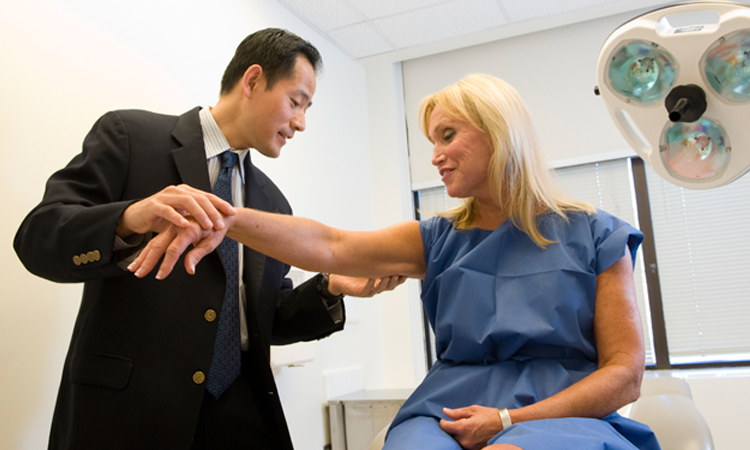Melanoma
Melanoma and Pigmented Lesion Center


Contact Information
The Melanoma Center and Pigmented Lesion Center
50 Staniford Street, Suite 200
Boston,
MA
02114
Phone: 617-724-6082
Fax: 617-643-2655
Explore This Treatment Program
Overview
The Melanoma Center and Pigmented Lesion Center (PLC) at Massachusetts General Hospital has been at the forefront of cutaneous melanoma research and melanoma patient care for over 40 years.
The PLC provides a one-stop-shop approach to treating melanoma and handles all aspects of care required by early-stage patients.
What to Expect
During an initial consultation, the patient's moles and skin lesions are examined by a team that includes a dermatologist, a cancer surgeon and a melanoma pathologist. Our multidisciplinary team then works together to quickly diagnose the precise condition and map out the most effective treatment. If the disease has spread to other sites, a medical oncologist might join our team as well.
We have a high-risk unit that focuses on the initial surgical treatment and the first five years of post melanoma surveillance. Once patients have passed this early often difficult period, we also have a lower-risk “step down” unit that continues the surveillance for up to 10 years. Patients at extreme risk for melanoma because of genetic factors may remain within our care past the 10-year period. During all follow-up visits, we continually reinforce melanoma education and prevention.
As part of the Mass General Melanoma Center, we regularly interact with surgical, medical and radiation oncologists who specialize in melanoma management. We direct patients with advanced-stage melanoma to these specialists when necessary.
About Us
Our center was established in 1966 to advance understanding of cutaneous melanoma, a relatively rare cancer at the time. The incidence of this disease has since risen dramatically, and we have become one of the major centers for melanoma patient care in New England and a leader in all aspects of melanoma investigation.
The PLC team offers outside physicians and dermatologists consultative services for moles and melanoma. Each year, we evaluate over 200 new melanoma patients and host over 3,000 visits. The experience we gain in handling large numbers of cases improves outcomes for all of our patients.
An Emphasis on Genetic Counseling
Because the link between family history and cancer has been well established, we place special emphasis on genetic counseling. In fact, we have led the way in integrating this component of melanoma treatment. With over 200 melanoma-prone families from all over the world participating in our research efforts, we are making steady progress towards understanding the fundamental causes of melanoma.
Moreover, our patients have the opportunity to examine not just the disease they have, but whether they might pass on this disease to the next generation.
Research Focusing on Heredity
Our team is interested in heredity's role in melanoma risk as well as how changes in DNA dictate the growth of melanoma tumors and their sensitivity to therapy. We are particularly interested in families with melanoma, because cancers in the familial setting often provide clues to their origin.
Currently, we are enrolling melanoma patients with a family history in a large cancer-risk trial. The potential benefits from a clearer understanding of melanoma at the genetic level are limitless. Contact us to learn more about participating.
Our Research Breakthroughs
The PLC is deeply committed to achieving breakthroughs in melanoma research. As a research unit, our investigators were among the first to describe:
- The different cutaneous melanoma subtypes
- The association between sun exposure and cutaneous melanoma
- The various factors that predict outcome from histological markers
- The use of sentinel lymph node biopsies in the staging of melanoma patients
In addition, our laboratory has been heavily involved in "dismantling" the melanoma engine that drives tumor progression. Through the years, we have shown various patterns of mutations that occur in the tumor, leading to melanoma growth.
Incorporating the Latest Technology
The PLC collaborates with scientists in computer science, artificial intelligence, imaging technology and more to define better methods for detecting melanoma.
Hensin Tsao, MD, recommends what you can do to protect your family from melanoma
Hensin Tsao, MD, Director of Mass General's Melanoma and Pigmented Lesion Center explains how family history, genetic risks and personal health history can all affect your risk of melanoma, and what steps you should take to detect it at an early, treatable stage.
The Melanoma Center and Pigmented Lesion Center (PLC) at Mass General provides care for patients with or at risk for developing cutaneous melanoma
The Melanoma Center and Pigmented Lesion Center (PLC) at Mass General l is the nation's longest-standing multidisciplinary clinic providing care for patients with—or at risk of developing—cutaneous melanoma
Meet our Team
-
![]()
- Department of Pathology
- Department of Dermatology
-
![]()
- Professor of Dermatology, Harvard Medical School
-
![]()
- Clinical Director, MGH Melanoma& Pigmented Lesion Center
- Director, MGH Melanoma Genetics Program
-
![]()
- Associate Professor of Dermatology, Harvard Medical School
- Faculty Director of Pediatric Dermatology, Harvard Combined Dermatology Residency Program
- Director of Pediatric Dermatology
What is melanoma and how can it be prevented? Learn more about this skin cancer condition and who is at most risk.
Patient Gateway
Secure online access to your health information whenever you need it. Check appointments, communicate with your provider and pay bills online 24/7.
Prevention & Detection
When caught early, skin cancer is highly treatable.
Contact the Melanoma and Pigmented Lesion Center
We provide care for patients with or at risk for developing cutaneous melanoma.




